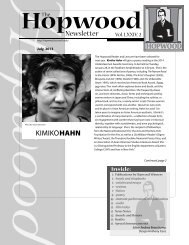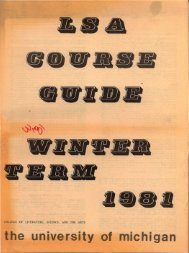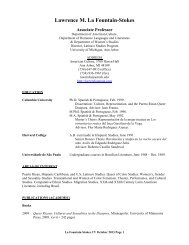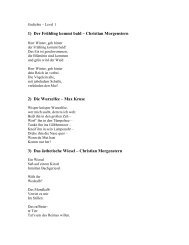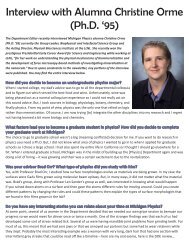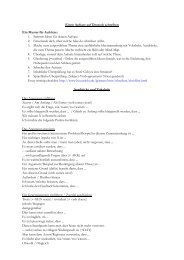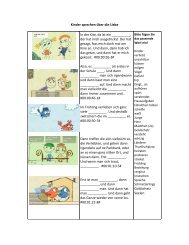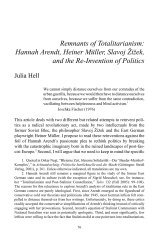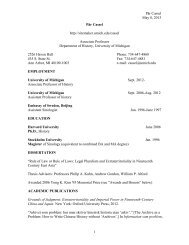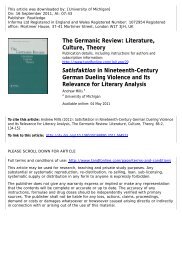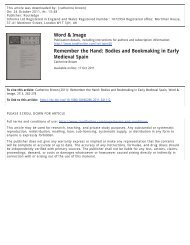Making History Personal: Constantine Cavafy and the Rise of Rome
Making History Personal: Constantine Cavafy and the Rise of Rome
Making History Personal: Constantine Cavafy and the Rise of Rome
Create successful ePaper yourself
Turn your PDF publications into a flip-book with our unique Google optimized e-Paper software.
Frier, “<strong>Making</strong> <strong>History</strong> <strong>Personal</strong>,” page 14<br />
nizing but anti-Seleucid Maccabean king <strong>of</strong> Judea (ruled 134-104). 42 Although <strong>the</strong> narrator‘s<br />
“conscience isn’t troubled by <strong>the</strong> fact / that I’m so completely indifferent to my choice,” he is<br />
deeply unhappy with all his possibilities, since: “All three <strong>of</strong> <strong>the</strong>m harm Syria just <strong>the</strong> same.”<br />
“The almighty gods should have taken <strong>the</strong> trouble / to create a fourth man, who was good. / With<br />
pleasure I’d have gone along with him.” The mood <strong>of</strong> this poem was brilliantly captured by<br />
Marguerite Yourcenar in 1939, on <strong>the</strong> eve <strong>of</strong> World War II: “A perspective without illusions, but<br />
not desolate even so: we should hesitate to call it bitter, yet it is certainly bitterness <strong>and</strong> rigor that<br />
we discover under <strong>the</strong> imperceptible curve <strong>of</strong> a smile.” 43<br />
The full consequence <strong>of</strong> <strong>the</strong> Seleucid decline is drawn in “Antiochus <strong>the</strong> Cyzicene”<br />
(1920, unfinished), set early in that king’s tumultuous reign (114-96), <strong>and</strong> probably shortly after<br />
he seized Antioch in 113. The poem depicts a kingdom reduced to “barely … half” its former<br />
dimensions, which “once began, <strong>the</strong> historians say, / at <strong>the</strong> Aegean <strong>and</strong> went right up to India.”<br />
Now it is beset “with <strong>the</strong> little kingdoms, with John Hyrcanus, / with <strong>the</strong> cities that are declaring<br />
<strong>the</strong>ir independence”; <strong>and</strong> yet <strong>the</strong> king has no<br />
time except for frivolities: “Let’s have a<br />
look at those puppets, / <strong>the</strong> animals he’s<br />
brought us.”<br />
44<br />
Hellenistic World in 90 BCE<br />
(http://www.e-grammes.gr/maps/90.jpg)<br />
The political reality, <strong>the</strong>n, was firmly<br />
set by <strong>the</strong> twilight years <strong>of</strong> <strong>the</strong> second cen-<br />
tury. Four o<strong>the</strong>r poems deal with <strong>the</strong> suc-<br />
42<br />
The tangled politics <strong>of</strong> this period are described by Bevan, Seleucus II (1902) 247-253, in a chapter titled<br />
“The Last Convulsions.”<br />
43<br />
Yourcenar, “Critical Introduction” (1939/1980) 169.<br />
44<br />
The puppet anecdote comes from Diodorus 34/35.34, <strong>the</strong> source cited by Bevan, Seleucus II (1902) 253<br />
(“[T]he Syrians were soon disillusioned. … [A] bold <strong>and</strong> splendid hunter, … he was … far more keenly interested<br />
in mimes, conjuring tricks, <strong>and</strong> ingenious mechanical toys than <strong>the</strong> affairs <strong>of</strong> state.”) <strong>Cavafy</strong> appears to have consulted<br />
Diodorus directly: “Shortly after Antiochus Cyzicenus gained <strong>the</strong> throne he lapsed into drunken habits, crass<br />
self-indulgence, <strong>and</strong> pursuits utterly inappropriate to a king. … He practiced also how to manipulate puppets, …<br />
He was, moreover, addicted to hunting at odd <strong>and</strong> unseasonable hours, … [a]nd since in grappling with brute beasts<br />
he was reckless, he frequently put his own life in extreme peril.” This is a model instance <strong>of</strong> how <strong>Cavafy</strong> mined<br />
historical sources for his poetry. The contempt is obvious already in <strong>the</strong> source; what <strong>Cavafy</strong> adds is historical context<br />
<strong>and</strong> a sense <strong>of</strong> <strong>the</strong> sour hostility that contemporaries doubtless felt toward Cyzicenus. On Antiochus IX Cyzicenus,<br />
see Ehling, Untersuchungen (2008) 217-230; on this poem, Jeffreys, Eastern Questions (2005) 96-97.



